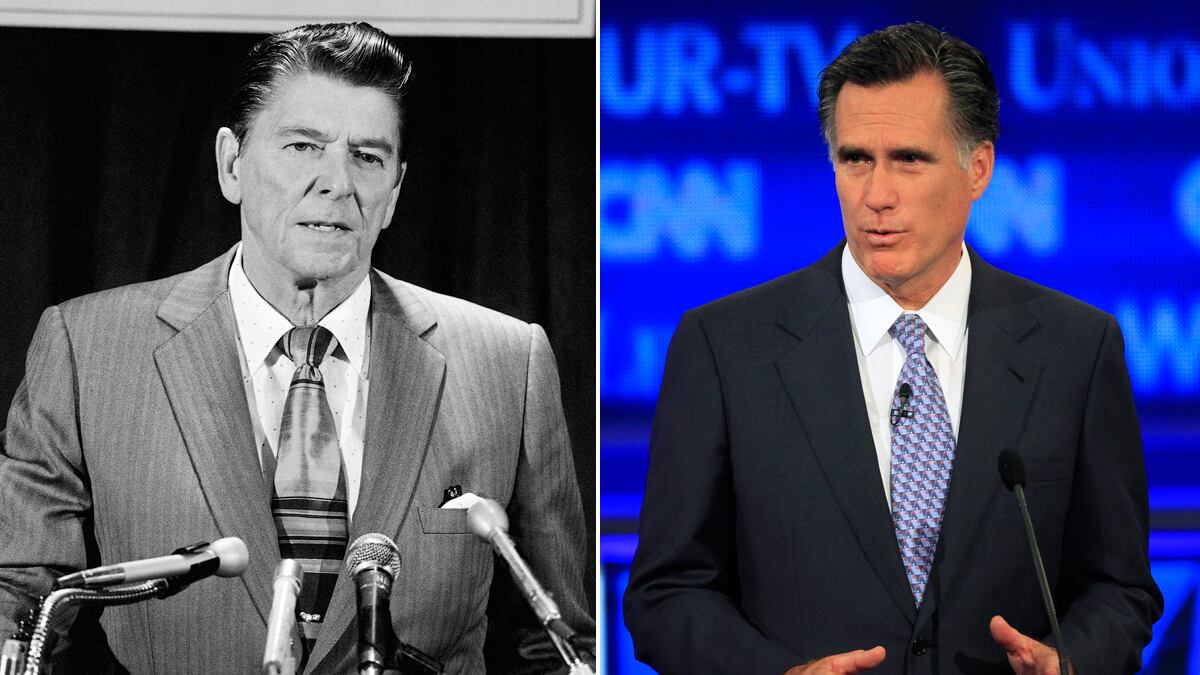Every four years, Republican president candidates promise to emulate Ronald Reagan. This year, surprisingly, they’re actually doing it.
I’m referring to their comments on Afghanistan. At last week’s GOP debate, Mitt Romney shocked neoconservatives by declaring that America "shouldn't go off and try and fight a war of independence for another nation." Jon Huntsman has gone further, declaring that “the very expensive boots on the ground may be something that is not critical for our national-security needs, nor is it something we can afford [at] this point in our economic history.” Even Newt Gingrich ventured that "We should say to the generals, ‘We would like to figure out [how] to get out as rapid [sic] as possible with the safety of the troops involved.’” So far, at least, not one major Republican hopeful is arguing that the U.S. must do whatever it takes to win the war that America launched after the 9/11 attacks.

The Republican foreign-policy establishment is appalled. Danielle Pletka, head of foreign policy at the American Enterprise Institute, has called Romney a “weather vane.” But if being a weather vane means trying to avoid wars that America can’t afford and the American people won’t sustain, the Republican presidential field has a lot more in common with Ronald Reagan than do the uber-hawks that form the GOP’s permanent foreign-policy class.
The dirty little secret of Reagan’s foreign policy is that he was extremely reluctant to send U.S. troops into harm’s way—more reluctant, in fact, than every president who has followed him. When Reagan took office, conservative intellectuals like National Review editor William F. Buckley and Commentary editor Norman Podhoretz urged him to consider sending U.S. troops to Central America to keep communists from entrenching their rule in Nicaragua and exporting it to neighboring El Salvador. Conservative rhetoric about the consequences of communist rule in Latin America, in fact, was even more apocalyptic than today’s conservative rhetoric about the consequences of renewed Taliban rule in Afghanistan. Reagan wanted to defeat Latin American communism, too: He sent military aid to the government of El Salvador and to the anti-communist Contra rebels in Nicaragua. But he never seriously considered dispatching U.S. troops, even when it became clear the Contras couldn’t win on their own. Right-wingers complained, but Reagan didn’t budge. “Those sons of bitches won’t be happy until we have 25,000 troops in Managua,” he told his chief of staff, “and I’m not going to do it.”
Reagan, in fact, only sent American ground forces into combat twice. He invaded Grenada, an island with 600 troops. And he dispatched peacekeepers to Lebanon. Then, in October 1983, Hezbollah terrorists bombed the U.S. barracks in Beirut, killing 241 Marines while they slept. At first, Reagan played John Wayne. House Speaker Tip O’Neill “may be ready to surrender,” he declared, “but I’m not.” And then—five days later, with the polls showing Americans souring on the Lebanon policy—Reagan decided to pull the troops out. Midge Decter, Podhoretz’s wife and a prominent neoconservative herself, said she was “disgusted.” In America’s first major confrontation with Islamist terror, Reagan had cut and run. But for Reagan, the lesson was exactly the opposite. His final words as president were “the worst thing I ever did was send those troops to Beirut.”
What contemporary conservatives forget about Reagan was that while he spent billions trying to roll back communism, he shared the American people’s profound desire never to fight another war like Vietnam. Military interventions that we today remember as trivial—like America’s 1989 invasion of Panama—terrified Reagan. In fact, he refused to topple Manuel Noriega, even when hawkish advisers pushed him, because didn’t want to start “counting up the bodies.”
It was only after Reagan’s departure that military victories in Panama, the Gulf, Bosnia, and Kosovo—plus the 1990s economic boom—made war look affordable and easy. The neoconservatives who cheered George W. Bush’s invasion of Iraq often called themselves “Reaganites,” but in their almost casual willingness to send U.S. ground forces into battle, they were anything but.
In looking honestly at the American public’s fatigue with the Afghan War—and our inability to pay for it—Romney and Huntsman are actually returning GOP foreign policy to its Reaganesque roots. Rhetorically, Reagan often exaggerated the threats posed by America’s enemies, and he created budgetary problems of his own by lavishing far too much money on the military. But he understood in his bones—like Franklin Roosevelt, Dwight Eisenhower, and Richard Nixon before him—that America was not a nation that could, or should, sustain long ground wars, except against the direst of threats. Reagan’s political genius lay in his ability to tap the spirit of limitless possibility that helps form the American character while quietly accommodating himself to the very real limits on American power. If today’s Republican hopefuls can do the same, Americans of both parties will owe them a debt of thanks.






